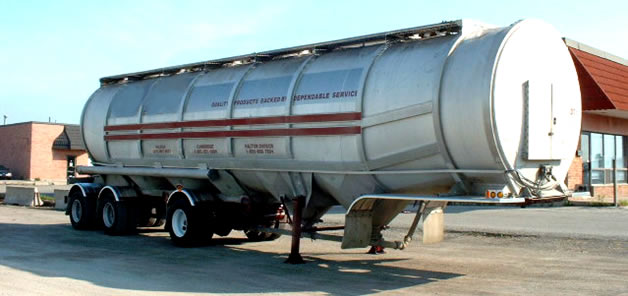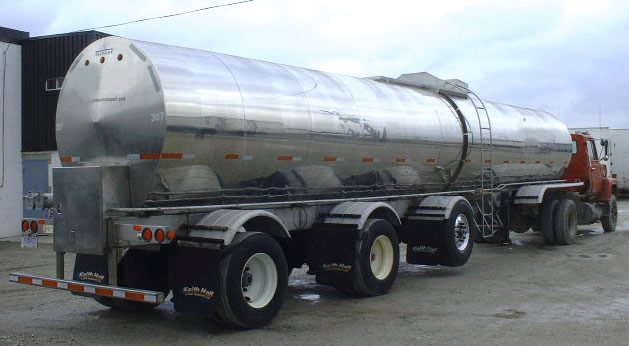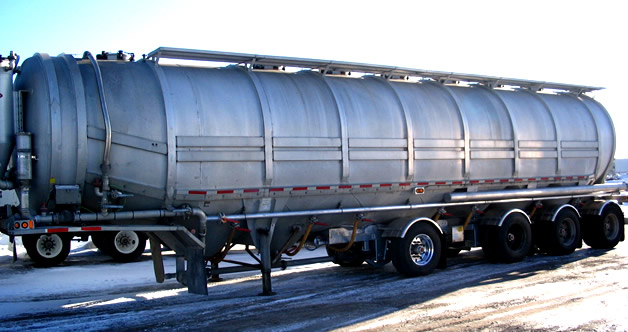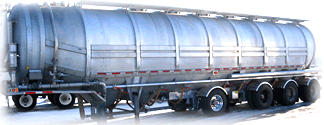|
G&D Tank and Trailer is a
National Safety Mark certified shop. G&D can install steer axles on your
existing lift axle trailers to meet new SPIF requirements and maximize load
capacity. Below are just some of the SPIF conversions completed at G&D. For
more information, See Frequently
Asked Questions below.
|

Convert tri-axle to 3 axle spif with steer
axle and rebuild frame.
|
|

Convert tri-axle to 3 axle spif with steer
axle and rebuild frame.
|
|

Convert tri-axle to 4 axle spif with steer
axle and rebuild frame.
|
FREQUENTLY ASKED
QUESTIONS
Question:
What is SPIF :Safe, Productive, Infrastructure-Friendly Vehicles ?
Answer:
The new regulation is intended to cause a migration of tractor trailers to
Safe,
Productive, Infrastructure-Friendly (SPIF) alternatives. The regulation
includes 13
SPIF tractor-trailer combinations. These vehicles provide a range of
productive alternatives without the associated excessive damage to roads and
bridges.
Highway safety will improve as SPIF
vehicles provide superior stability and control and can operate within
acceptable amounts of space when turning or making emergency manoeuvres. In
addition, the heavy 5 and 6-axle SPIF semi-trailers are equipped with an
enhanced braking system to minimize the risk of brake failure and warn the
driver of potential problems.
A number of SPIF semi-trailers make use of
self-steering axles in place of rigid lift-axles. The self-steering axles
remain on the road at all times when the vehicle is loaded so that all axles
take their proper share of the weight and contribute to the stability and
braking ability of the vehicle. To further protect highway pavement, all
axles on SPIF semi-trailers automatically load-equalize so that the weight
of the trailer and load is equally spread over all trailer axles.
Question:
What are the four phases of Vehicle Weight & Dimension Reforms?
Answer:
Phase 1 was introduced in 2001 and subsequently modified to address all
non-dump semi-trailers with 3 or less axles. Except for some very
specialized tankers, all of these semi-trailers must meet SPIF standards by
January 1, 2006 or incur a 3,000 kg reduction from their allowable gross
weight. This reduction will increase to 4,500 kg in 2011 or 2021 depending
on semi-trailer body style.
Phase 2 was introduced in mid-2002 and
addressed dump semi-trailers, including end-
Dumps and open hopper dumps. Any of these trailers built after 2002 must
meet SPIF
standards, or operate at reduced weights. All such trailers built prior to
2003 are grandfathered and may continue to operate for their reasonable
operating life. Also as part of Phase 2, it was determined that the special,
more restrictive method of
calculating allowable gross weights for aggregate vehicles was no longer
necessary for
tractor-trailer combinations that meet SPIF standards.
Phase 3 addresses all non-dump
semi-trailers with 4 or more axles and all double
trailers. Any of these trailers built after 2005 must meet SPIF standards,
or operate at significantly reduced weights. All such trailers built prior
to 2006 are grandfathered and
may continue to operate for their reasonable operating life.
Phase 4 will address straight trucks and
their trailers. In addition, SPIF 4-axle tractor
alternatives will be further explored. Policy development will commence in
2006.
Research, testing and stakeholder consultations are expected to take at
least two years.
No changes are therefore expected until some time in 2008 or 2009.
Question:
Where can I get a copy of the new Regulation 413/05?
Answer:
The regulation is available at
www.e-laws.gov.on.ca. Under the listing for the Highway
Traffic Act look for the regulation titled, “Vehicle Weights and Dimensions
– for Safe,
Productive, Infrastructure-Friendly Vehicles”. If you do not have direct
internet access,
you should enquire at a pubic library – most libraries provide internet
access and
assistance in its use. |






